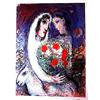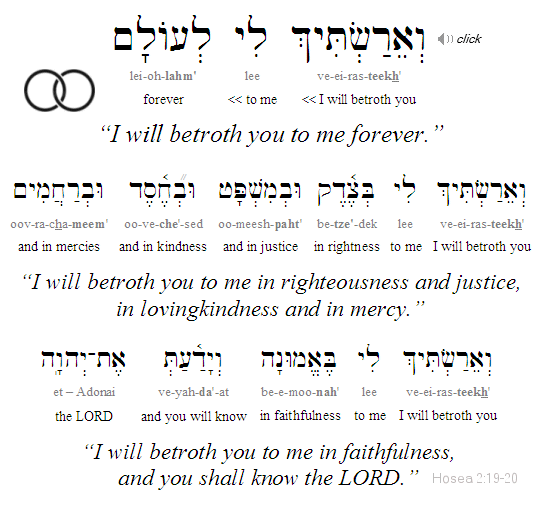|
The prophet Hosea (הוֹשֵׁעַ) was to the northern kingdom of Israel what the prophet Jeremiah would later be to the southern kingdom of Judah - a man of sorrows, vexed and oppressed by the waywardness of his people, a voice crying out in the wasteland of sin, a prophet raised up by God first to warn and then to finally witness the destruction and captivity of his people. In the case of Hosea, however, God made the prophet's most intimate family life into a "metaphor" of His troubled relationship with his people, and therefore the LORD commanded him marry a prostitute so that the people would understand God's profound heartache and outrage over Israel's infidelity: "Go, take to yourself a prostitute (אֵשֶׁת זְנוּנִים) who will bear children conceived through prostitution, for the land commits great prostitution by forsaking the LORD" (Hos. 1:2). Hosea obeyed and married a woman named Gomer, who bore him a son named Jezreel (i.e., Yizra'el: יִזְרְעֶאל, "God sows"), so named because judgment would soon befall the dynasty of Jehu (i.e., the of kingdom of Israel). Israel would soon face judgment in the "Valley of Jezreel."
Sometime later Gomer conceived again, but not by means of Hosea, and therefore the daughter who was born was to be called "No Mercy" (i.e., lo ruchamah: לא רֻחָמָה), so named because Israel would be shown no mercy when the Assyrian army would arrive to carry the people away. Gomer later conceived and bore a son, again not by Hosea, who was to be called "Not my people" (i.e., lo ammi: לא עַמִּי), so named to proclaim that the people had separated themselves from the LORD because of their incorrigible idolatry.
Nonetheless, God is forever faithful and His chesed endures forever, and therefore He promised that in the "latter days" (בְּאַחֲרִית הַיָּמִים), Gomer (Israel) and her children would be restored to Him. Regarding the future of both Israel and Judah, the LORD says, "Although it was said to them, "You are not my people," it will be said to them, "You are children of the living God (בְּנֵי אֵל־חָי). Then the people of Judah and the people of Israel will be gathered together, and they will appoint for themselves one leader, and will flourish in the land. Certainly, the day of Jezreel will be great! Then you will call your brother, "My People" (i.e., ammi: עַמִּי), and you will call your sister, "Mercy" (i.e., ruchamah: רֻחָמָה)." (Hos. 1:10-2:1).
The prophet then returned to the imminent hour of judgment that would soon befall faithless Israel, using the painful (and prophetic) experience of his own desecrated marriage with Gomer to make God's case. "Plead with your mother, plead - for she is not my wife, and I am not her husband - that she put away her fornication from her face, and her adultery from between her breasts. Otherwise, I will strip her naked, and expose her like she was when she was born. I will turn her land into a wilderness and make her country a parched land, so that I might kill her with thirst." Israel's spiritual adultery will not go unpunished, and God's love will not be unrequited. "I will have no mercy (לא אֲרַחֵם) on her children, because they are children conceived in prostitution" (Hos. 2:4).
Despite the coming judgment, however, the prophet repeats the promise that faithless Israel will one day be fully reconciled with the LORD. "At that time," declares the LORD, "you will call out, 'My husband!' (i.e., ishi: אִישִׁי); you will never again call me, 'My master' (i.e., baali: בַּעְלִי, a name associated with the pagan god "Baal"). For I will remove the names of the Baal idols from your lips, so that you will never again utter their names." Just as Hosea redeemed Gomer from her life of prostitution (Hos. 3:1-5), so God will redeem Israel and betroth her to Himself forever:
וְאֵרַשְׂתִּיךְ לִי לְעוֹלָם
וְאֵרַשְׂתִּיךְ לִי בְּצֶדֶק וּבְמִשְׁפָּט וּבְחֶסֶד וּבְרַחֲמִים
וְאֵרַשְׂתִּיךְ לִי בֶּאֱמוּנָה וְיָדַעַתְּ אֶת־יְהוָה
ve·e·ra·steekh · lee · le·o·lam
ve·e·ra·steekh · lee · be·tze'·dek · oov·meesh·paht · oov·che'·sed · oov·ra·cha·meem
ve·e·ra·steekh · lee · be·e·moo·nah · ve·ya·da'·at · et-Adonai

"And I will betroth you to me forever.
I will betroth you to me in righteousness and in justice,
in lovingkindness and in mercy.
I will betroth you to me in faithfulness. And you shall know the LORD."
(Hos. 2:19-20)

Hebrew Study Card
These precious words are an "echo from the future" that foretell Israel's future restoration and salvation as the beloved of the LORD. These words of love portend the great day when "all Israel shall be saved" (Rom. 11:26). (Today these verses are often recited in traditional betrothal ceremonies (i.e., erusin: אֵרוּסִין), and every day when tefillin (תפילין) are put on during morning services by Orthodox Jews.)
This is yet another amazing story of God's passionate love revealed in the Scriptures.... God is like a "jilted lover" who refuses to give up on us. He loves us even in the filth of our depravity and redeems us from a life of shame. He zealously seeks us, takes us back, and restores us to a place of honor and joy...
God is our Creator, our King, our Judge, our Redeemer - but most importantly He is our Father who profoundly loves us as his children... We are like prodigal sons for whom his heart yearns... But, as the prophet Hosea reveals, the LORD is even likened to our faithful husband, indeed, even our lover! "Let him kiss me with the kisses of his mouth" (Song. 1:2). Yesh ohev davek me'ach (יֵשׁ אהֵב דָּבֵק מֵאָח): "There is a lover who sticks closer than a brother" (Prov. 18:24). It is vital to understand that sin does not mean breaking God's law as much as it means breaking God's heart... Of the various metaphors of our relationship with God, "Father," "Husband," "Lover" and "Friend" are surely ultimate... God created and redeemed us for the sake of His love to be expressed to us. Like Gomer, we cannot let the power of shame overwhelm our gratitude for the cross. May we open our hearts to Him!
Hebrew Reading:
 |
|




